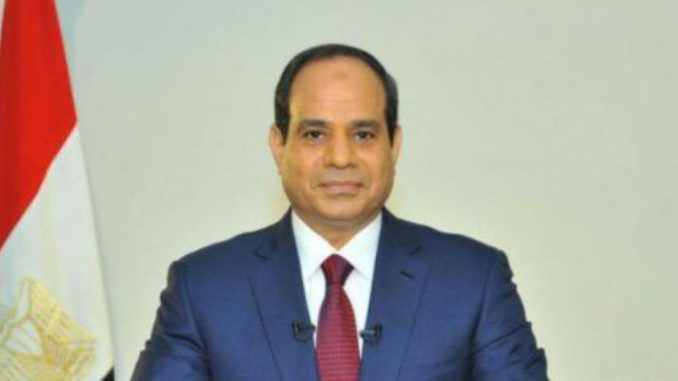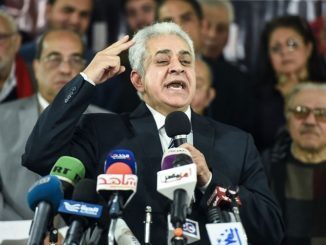
During the inauguration of the National Project for Fish Farming in the Suez Canal area in Ismailia, Abdel Fattah Al-Sisi called on Egyptians to endure the economic hardships for the next six months.
During his speech, he reasserted the state’s commitment to the economic reform programs, and promised the Egyptians and the investors that the situation will improve.
Abdel Fattah al-Sisi, who led a military coup in 2013 against Egypt’s first democratically elected President Mohamed Morsi, couldn’t rescue the Egyptian economy as he previously promised.
The economic conditions deteriorated in an unprecedented way under his reign.
Tourism and foreign investments, the two sources for foreign currency, have declined as a result of political instability and lack of security.
As a result, the Central Bank of Egypt (CBE) devalued the Egyptian currency in March.
The devaluation of the Egyptian pound and the shortage of foreign currency have flourished the black market on the currency expense and led to inflation. Inflation has reached its highest rate throughout 8 years -exceeding 19%.
In this context, Abdel Fattah al-Sisi has chosen to take the Egyptian people through the hard path by seeking to secure a loan from the International Monetary Fund(IMF).
In this context, Egypt’ s al-Sisi has worked to fulfill the IMF economic reform program to secure the loan.
Last November, the International Monetary Fund’s executive board has approved Egypt’s request to secure $12 billion loan facility after Egypt met its requirements.
On August 30 Egypt started its first steps towards the loan when Egypt’s parliament approved a long-awaited law introducing a value-added tax (VAT) of 13 %, rising to 14% in the next fiscal year.
On November 3, the Central Bank of Egypt floated the Egyptian pound and gave up trying to peg the currency to the US dollar allowing it to devalue by almost half.
On November 4, Egypt took another unprecedented decision, which has always been abandoned by former leaders in fear of public unrest, to cut subsidies for fuel leading to jump in prices, in addition to the introduction of the value-added tax to raise revenues.
Abdel Fattah al-Sisi has said before that he would not hesitate “for one second” to take the difficult steps necessary to ensure Egypt lives within its means.
All Egypt’s presidents tend to avoid these economic measures of the IMF recalling poor Egyptians riot when President Anwar Sadat removed them on flour, rice, and oil in 1977, part of an effort to secure IMF-backed financing.
He reinstated later from the decision. Though Egypt has returned to the IMF virtually every decade since the 1970s, implementation of reforms has been mixed.
More recently, Egypt negotiated two IMF deals that were never finalized, including a $4.8 billion loan initially agreed in 2012.
In December, the Financial Times stated that Egypt’s rule is the worst under al-Sisi regime an article titled “Sisi’s Egypt: The march of the security state.” FT said that Egypt’s “social and economic problems are deeper than ever under the former general’s regime.”
In the same context, last August, the Economist highlighted al-Sisi as the one who is responsible for the ruining of Egypt in its editorial titled: The Ruining of Egypt…Repression and the incompetence of al-Sisi are stoking the second uprising.”
The magazine said at the end of its editorial that the demographic, economic and social pressures in Egypt are relentlessly increasing and that al-Sisi is incapable of providing the sustainable stability to Egypt, the political regime also needs to be reopened.
The magazine considered al-Sisi’s withdrawal from the political life is the hope gate for the Egypt. The Economist continued saying, “Egypt’s political system needs to be reopened. A good place to start would be for al-Sisi to announce that he will not stand again for election in 2018.”



